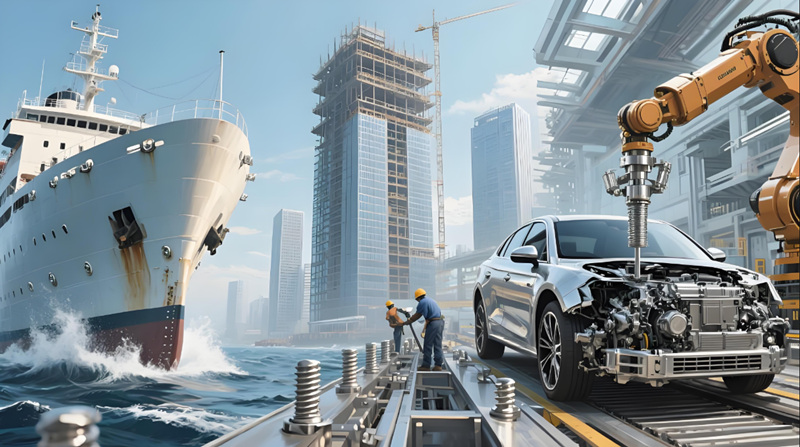
Stainless steel fasteners are among the most reliable and versatile components in modern engineering and manufacturing. Known for their strength, corrosion resistance, and durability, they play a crucial role in a wide range of industries. This article focuses on the industrial applications of stainless steel fasteners, specifically in the marine, construction, and automotive sectors—three demanding fields where performance and reliability are critical.
Why Choose Stainless Steel Fasteners?
Before diving into specific industries, it's important to understand why stainless steel is the material of choice for fasteners:
Corrosion Resistance: Especially in harsh environments with exposure to moisture, chemicals, or salt.
Strength and Durability: Excellent mechanical properties allow stainless fasteners to handle high loads and stress.
Aesthetic Appeal: A clean, professional appearance makes them ideal for exposed applications.
Temperature Resistance: Performs well in both high-heat and sub-zero conditions.
Low Maintenance: Long life span reduces the need for frequent replacements.
Grades like 304 and 316 stainless steel are particularly popular, with 316 offering superior resistance to saltwater and chemicals.
Marine Industry Applications
The marine environment is one of the most corrosive on earth due to the high salt content, constant humidity, and potential for chemical exposure. Stainless steel fasteners—especially 316 grade—are essential for resisting rust and maintaining structural integrity in such conditions.
Key Uses:
- Boat Hull Assembly
- Deck Hardware and Rigging
- Marine Engines and Outboards
- Dock Construction and Fixtures
- Navigation Equipment Mounting
Stainless steel fasteners ensure longevity and safety in both recreational boating and commercial shipping, where reliability is non-negotiable.
Construction Industry Applications
In the construction industry, fasteners must withstand environmental exposure, heavy loads, and long-term wear. Stainless steel is widely used in everything from skyscrapers to infrastructure projects.
Key Uses:
- Steel Frame Connections
- Façade and Cladding Systems
- Roofing and Structural Supports
- Concrete Anchoring
- Bridges and Outdoor Structures
Stainless fasteners offer excellent resistance to corrosion, especially in coastal or high-humidity areas. They also comply with stringent building codes and safety regulations, making them a go-to choice for engineers and contractors.
Automotive Industry Applications
Vehicles demand components that can endure vibration, temperature fluctuations, chemicals, and constant movement. Stainless steel fasteners are crucial for both internal engine components and external structural integrity.
Key Uses:
- Engine and Exhaust Systems
- Chassis and Suspension Assemblies
- Body Panels and Trim
- Battery and Electrical System Mounting
- Brake and Fuel System Components
Stainless steel not only enhances durability and safety but also contributes to vehicle weight reduction in some applications, improving fuel efficiency and performance.
Choosing the Right Stainless Steel Fastener
Each industry has its own demands. Here are a few tips when selecting the appropriate fastener:
- Use 316 stainless steel for marine and highly corrosive environments.
- Consider mechanical load requirements—tensile strength, shear force, etc.
- Verify compatibility with other materials to avoid galvanic corrosion.
- Use certified fasteners that meet industry standards (e.g., ASTM, ISO).
Conclusion
Stainless steel fasteners are the backbone of modern industrial engineering, offering unmatched performance in marine, construction, and automotive applications. Their resistance to corrosion, mechanical strength, and long-term reliability make them indispensable wherever safety and efficiency matter most.
Whether you're securing a ship’s deck, reinforcing a skyscraper, or assembling a high-performance engine, stainless steel fasteners deliver performance you can trust
